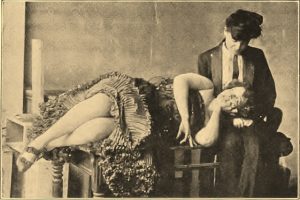 Author’s Note: I am not distinguishing between trans and cis women. I have had conversations with both and, while there is some divergence of experience, for the purposes of this post, “femme-identified woman” applies to anyone who identifies as such, regardless of assigned sex at birth.
Author’s Note: I am not distinguishing between trans and cis women. I have had conversations with both and, while there is some divergence of experience, for the purposes of this post, “femme-identified woman” applies to anyone who identifies as such, regardless of assigned sex at birth.
By Malachi for Monomaniacism, cross-posted with permission
A few months ago, I published Are You Queer Enough?, which began a massive, complex line of dialogue that reaches so many facets of the queer community. There are so many aspects of queerness that I want to have dialogue about, and trying to put them all into one post is overwhelming…. I think writing a book might be a better medium. So I’m breaking this conversation into pieces, hoping we can have a respectful dialogue highlighting different aspects of accessibility within queer spaces.
After posting Are You Queer Enough? on FetLife, I have had the amazing privilege of speaking to some incredible people about their experiences and feelings around queerness and queer spaces. Although these conversations have crossed the spectrums of gender and identity, the overwhelming responses have come from femme-identified women*, so I wanted to start here in deconstructing the queer community and creating space in new ways.
I truly believe that femme erasure is a thing in the queer community, especially femme women, and especially femme women who also date people who are male-identified and male-presenting. I have had so many conversations with strong, amazing, beautiful women who really want to play with and interact with other women. But because they are femme-presenting, cis-het men tend to be the only people who approach them in public spaces, and they don’t feel comfortable coming to queer spaces because “queer enough” is a thing.
I do appreciate people trying to be respectful of a space that is designed to ensure that people who don’t often feel safe playing can feel safe and comfortable. I really do appreciate it, and think it’s important for people who benefit from heterosexual privilege to be aware of how that could impact queer space. And for that, I say thank you. But I also know that femme women experience an extreme degree of sexual harassment in daily life. It is different than folks who “look queer,” absolutely, but it reduces the entire complexity of a person down to a sexual object, which is how sexual harassment in my life (read: queer-looking person) manifests most frequently. As much as I am a walking fetish, many femme women are the walking embodiment of mainstream male sexual desire, and having experienced both, the two don’t really feel that different.
I don’t want to play the oppression game. I don’t want to have a checklist at the door where you list your credentials to prove your right to be here. Queerness is a radical, revolutionary concept, reclaimed from a dark and bloody history of violence and oppression. Queer was a slur used to justify rape, torture, and murder, and with little-to-no consequence. But femme women, in the midst of that history, were ostracized as much as anyone else. If they were with a butch, they were raped to show them how a “real man” does it. Femme women rioted at Stonewall. “Stone Butch Blues,” although a fiction story, describes the reality of butch-femme dynamics in a way that is mirrored through the history books, and mirrored through the stories of the women I grew up with, the women that raised me, the women who told me what it meant to reclaim “queer” as a self-identity.
There is a unique strength in being a femme woman. As someone who feels clunky and awkward when I shave my face and present female, I envy the strength it takes to put on clothes that make you feel sexy, put on makeup that makes you feel sexy, and walk into the world to have that self-empowerment be diminished by every person who catcalls you and makes your sexuality about them.
Fuck that. Fuck nine kinds of that, and if we, as the queer community, do not make it safe for femme women to come, to be present, to have that kind of safety that we cling to, to be able to express their sexuality without it being for the benefit of someone else, then we dishonor our own history. We dishonor the women who stood beside their butch lovers when they were released from prison. We dishonor the women that walked down the street and fought for the right to do so without a man on their arm. We dishonor the women who pioneered that radical notion of reclaiming their own sexuality.
We can do better. We need to do better, as a community, to make it welcoming and safe for femme women to feel included. I feel honored that so many women I respect came and spoke to me about the “queer enough” post, and I am so sick of a self-isolating, self-righteous queer community that doesn’t acknowledge its history yet allows itself to be self-selecting on the basis of arbitrary traits. That’s not what we are here for. We have got to find ways to make this space accessible for those who need it — regardless of how they look or who their partner is.